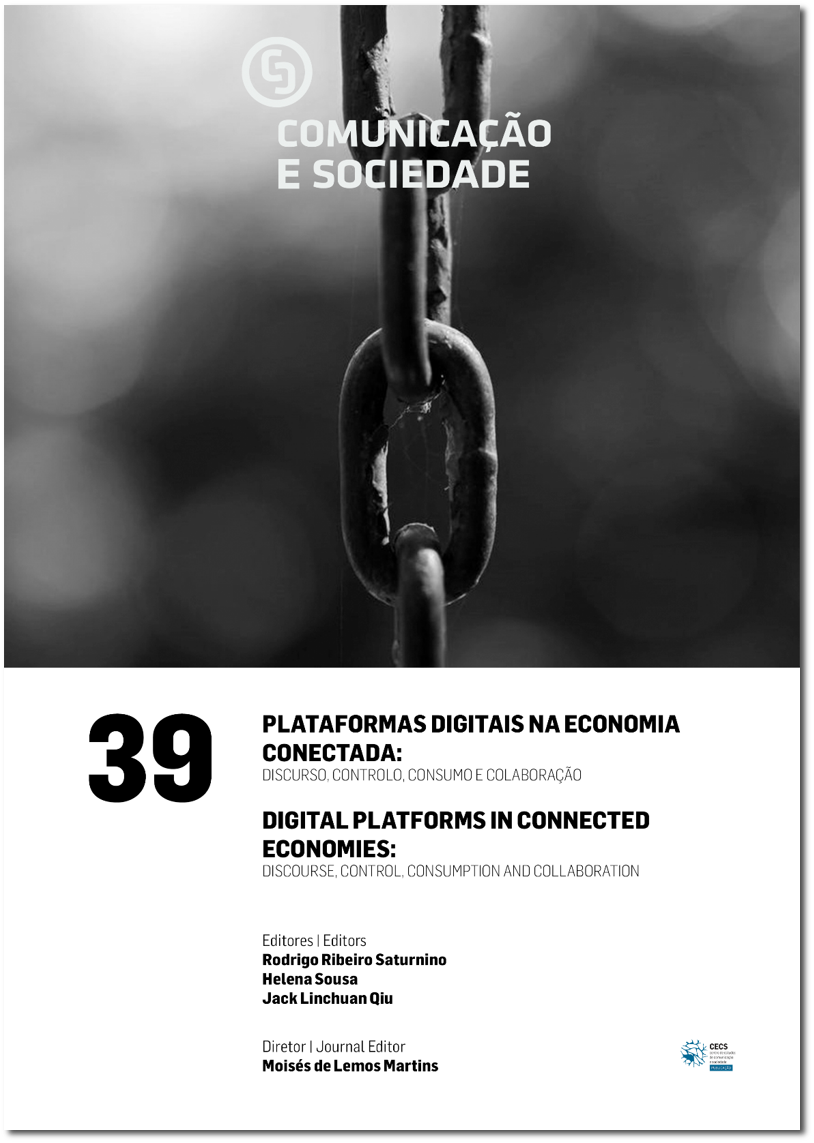“Breque dos Apps”: A Temporal Analysis of Communities and Influencers in Online Public Debate on Twitter
DOI:
https://doi.org/10.17231/comsoc.39(2021).2855Keywords:
collective identity, collective action, social networking platforms, Twitter, Breque dos AppsAbstract
The purpose of this article is to examine the dynamics of the debate on social networking platforms from the perspective of collective identity and collective action concepts. More specifically, we seek to identify who are the central actors on Twitter in the debate about the two delivery app workers’ strike against the work regime and working conditions during the pandemics (UberEats, iFood, Rappi, etc.) occurred on July 1 and 25, 2020, in Brazil. We also examined whether the most influential users played a role in the formation of communities around their interpretation of this topic. To do so, we collected 535,178 tweets published in two periods of workers’ demonstrations, which occurred between June and July 2020. Based on temporal analysis of clusters, we identified the moment of entrance of each community on the debate and discussed how profiles of influencers, social movements, politicians, and celebrities on Twitter played central roles in mobilizing supporters and fostering public engagement linked to acts on the networks. The results show that social mobilization in digital environments occurs from interactions between groups with great involvement with the causes and profiles of more ephemeral performance, whose participation is fundamental for the promotion and dissemination of acts.
Downloads
References
Abílio, L. C., Almeida, P. F., Amorim, H., Cardoso, A. C. M., Fonseca, V. P., Kalil, R. B., & Machado, S. (2020). Condições de trabalho de entregadores via plataforma digital durante a covid-19. Revista Jurídica Trabalho e Desenvolvimento Humano,3, 1–21. https://doi.org/10.33239/rjtdh.v.74
Bennett, L. W., & Segerberg, A. (2012). The logic of connective action: Digital media and the personalization of contentious politics. Information, Communication & Society, 15(5), 739–768. https://doi.org/10.1080/1369118X.2012.670661
Blondel, V. D., Guillaume, J.-L., Lambiotte, R., & Lefebvre, E. (2008). Fast unfolding of communities in large networks. Journal of Statistical Mechanics: Theory and Experiment, 1–12. https://doi.org/10.1088/1742-5468/2008/10/P10008
Bucher, T., & Helmond, A. (2017). The affordances of social media platforms. In J. Burgess, A. Marwick & T. Poell (Eds.), The Sage handbook of social media (pp. 233–253). Sage Publications.
Earl, J., & Kimport, K. (2011). Digitally enabled social change: Activism in the internet age. Mit Press.
Ellison, N., Lampe, C., Steinfield, C., & Vitak, J. (2010). With a little help from my friends: How social network sites affect social capital processes. In Z. Papacharissi (Ed.), A networked self: Identity, community and culture on social networking sites (pp. 124–145). Routledge.
Filgueiras, V., & Antunes, R. (2020). Plataformas digitais, uberização do trabalho e regulação no capitalismo contemporâneo. Revista Contracampo, 39(1), 27–43. https://doi.org/10.22409/contracampo.v39i1.38901
Gerbaudo, P. (2012). Tweets and the streets social media and contemporary activism. Pluto Press. http://doi.org/10.2307/j.ctt183pdzs
Grohmann, R. N., & Qiu, J. (2020). Contextualizando o trabalho em plataformas. Revista Contracampo, 39(1), 1–10. https://doi.org/10.22409/contracampo.v39i1.42260
Lipsky, M. (1968). Protest as a political resource. American Political Science Review, 62(4), 1144–1158. https://doi.org/10.2307/1953909
Lowrance, S. (2016). Was the revolution tweeted? Social media and the Jasmine revolution in Tunisia. Digest of Middle East Studies, 25(1), 155–176. https://doi.org/10.1111/dome.12076.
Martino, L. M. S. (2015). Teoria das mídias digitais: Linguagens, ambientes e redes (2.ª ed.). Vozes.
Milan, S. (2015). From social movements to cloud protesting: The evolution of collective identity. Information, Communication & Society, 18(8), 887–900. https://doi.org/10.1080/1369118X.2015.1043135
Peres, A. C. (2020, 6 de agosto). Olha o Breque! Movimento de entregadores expõe precariedade das relações de trabalho nas plataformas digitais. Radis 215. https://radis.ensp.fiocruz.br/index.php/home/reportagem/olha-o-breque
Recuero, R. (2017). Introdução à análise de redes sociais online. EDUFBA.
Rogers, R. (2017). Foundations of digital methods: Query design. In M. T. Schäfer & K. van Es (Eds.), The datafied society: Studying culture through data (pp. 75–94). Amsterdam University Press. https://doi.org/10.25969/mediarep/12536
Ruediger, M. A., Martins, R., da Luz, M., & Grassi, A. (2014). Ação coletiva e polarização na sociedade em rede para uma teoria do conflito no Brasil contemporâneo. Revista Brasileira de Sociologia, 2(4), 205–234. https:// doi.org/10.20336/rbs.83
Sena, V. (2020, 23 de julho). Ibope aponta que entregadores de apps não querem carteira assinada. Exame. https://exame.com/negocios/pesquisa-indica-que-entregadores-nao-querem-carteira-assinada-sera/
Tarrow, S. (2011). Power in movement: Social movements and contentious politics (3.ª ed.). Cambridge University Press.
Vergeer, M., Hermans, L., & Sams, S. (2011). Online social networks and micro-blogging in political campaigning: The exploration of a new campaign tool and a new campaign style. Party politics, 19(3), 477–501. https://doi.org/10.1177/1354068811407580
Zappavigna, M. (2015). Searchable talk: The linguistic functions of hashtags. Social Semiotics, 25(3), 274–291. https://doi.org/10.1080/10350330.2014.996948
Downloads
Published
How to Cite
Issue
Section
License
Copyright (c) 2021 Comunicação e Sociedade

This work is licensed under a Creative Commons Attribution-NonCommercial 4.0 International License.
Authors own the copyright, providing the journal with the right of first publication. The work is licensed under a Creative Commons Attribution 4.0 International License.











